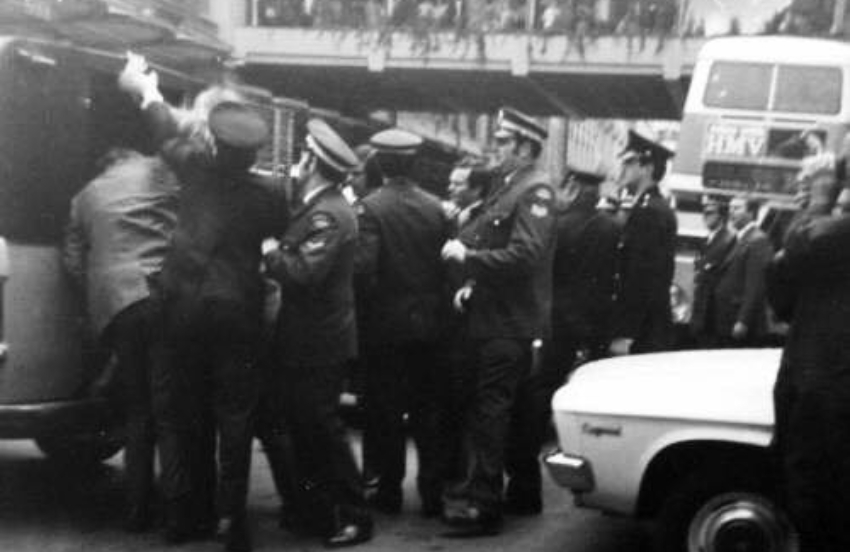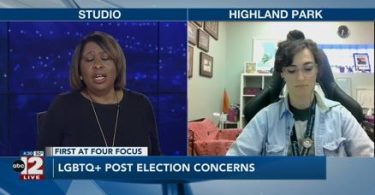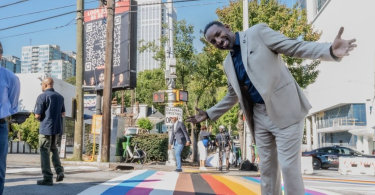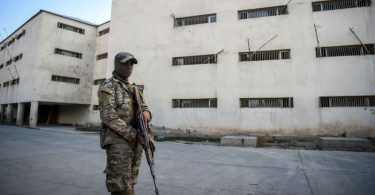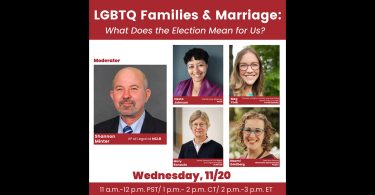Police in Sydney have today released the results of a three year review into suspected gay hate murders of 88 people over three decades. Called Strike Force Parabell, it is likely to leave a lasting impact on Sydney’s LGBTI community.
Parabell reviewed thousands of pages of evidence and turned up some interesting information.
It found one man, William Rooney, was likely the first victim of a serial killer targeting gay men. But there was not enough evidence to bring his alleged perpetrator to justice.
LGBTI groups and activists have welcomed the review. But they all agreed police should not have investigated themselves.
Sydney’s homophobic history
Almost 30 years ago, a group of armed men chased Alan Rosendale down a busy Sydney street after spotting him at a gay beat.
‘There’s one, let’s get him,’ one of the men said before they began their chase.
Rosendale ran for his life, but when he tripped and fell into a gutter, the men caught up with him.
Next thing he remembered is waking in hospital the next day, in a critical condition.
‘I had a broken nose, broken teeth, they bashed me around the head a lot,’ Rosendale told Gay Star News.
‘I had serious head injuries and I’ve still got a bump on my head.’
In the vague police report of his attack, the police didn’t spell Rosendale’s name correctly, they got his date of birth wrong.
‘I was punched and kicked to the ground in an area frequented by homosexuals was all the report said,’ Rosendale said.
Violent assaults on LGBTI people, but mainly gay men and trans women, were very frequent from the late 70s until the 1990s.
Many cases went unsolved. Most men didn’t bother reporting the matter to the police because they thought the police would do nothing about it.
At its worst, an average of 20 homophobic assaults were being reported on a daily basis to the AIDS Council of New South Wales (NSW) – now known as ACON. NSW is state of which Sydney is the capital
‘You just got over it’
For a long time, the horrific homophobic violence was Sydney’s dirty secret. But then gay men started dying in suspicious circumstances.
The LGBTIQ community knew about the murders and violence. They also knew police didn’t care or botched investigations.
‘I absolutely acknowledge there was escalated levels of violence against the community during that era,’ Assistant Commissioner Tony Crandell told GSN. Crandell is also the police’s Corporate Sponsor for Sexuality, Gender Diversity, and Intersex matters.
But like Rosendale people got on with their lives because they had to.
‘We all knew they were murders, but they were being reported as suicide. I just thought it would never happen to me,’ he said.
‘In 1989 you just got over it.’
But interest in the alleged gay hate crimes started to gain momentum in the 21st century. Journalist Rick Feneley’s investigations into that era helped spur on the NSW Police Force who was keen to make amends with the LGBTIQ after decades of animosity, discrimination and violence.
The 88
For years people have called for renewed investigations into the suspicious deaths of 87 men and one trans woman. Many believed these people were killed in anti-gay attacks.
In 2015, NSW Police launched Strike Force Parabell. Its objective was to review the 88 deaths between 1976 and 2000.
Tasked with finding out if those deaths happened because of gay-hate bias, the strike force had a tricky job ahead of it.
Today it released the findings in a 133-page report.
Crandell acknowledged the list of homophobic violence was probably a lot longer than just 88 suspicious deaths.
‘It (Parabell) was only limited to this 88 case list, and I really want to be clear on this point, it’s not a statement about the degree of violence inflicted upon on gays and lesbians in particular but on the entire LGBTI community between the 70s, 80s and 90s because it is there’s clear evidence that there was elevated violence against the LGBTIQ community during those times,’ he said.
Made up of nine specialist investigators, including Gay and Lesbian Liaison Officers (GLLOs), the strike force operated under Crandell’s command. An independent academic review from Flinders University also scrutinized the report and at times, strongly disagreed with the police.
The findings
The outcome of the Parabell review has been a long time coming for Sydney’s LGBTI community.
Of the 88 cases only eight could be directly linked to gay hate-bias crimes. Another 19 of those as suspected gay hate crimes. Five of those total cases remain unsolved.
34 were found not to be gay hate crimes and reviewers were unable to determine another 25 cases because of insufficient information.
Twenty-three of the 86 cases remain unsolved.
But NSW Police promised to keep the unsolved cases open under active investigation.
‘All of the unsolved matters under our responsibility are currently being triaged and prioritized for referrals to a reviewing officer with expertise in homicide investigations,’ said Homicide Squad Commander, Detective Superintendent Scott Cook.
‘Our goal is more answers for more families, and importantly, we want justice for more victims.’
About 83% of the cases had charges brought against the perpetrators. Many of the perpetrators had murder charges dropped to manslaughter after pleading the ‘Homosexual Advance Defence’. Also known as the ‘gay panic defence’, men used to justify their assault of a gay men, if they thought that man was coming on to them.
In 65 of the cases the perpetrators were straight.
Most of the the men died outside and 18 men died near a known gay beat.
What was the point of Parabell?
Crandell conceded Parabell’s finding will not lead to a re-investigation of the cases and it was also unlikely police at the time will be investigated for bias. But the point of Parabell was to acknowledge past wrongs.
‘I guess it’s an acknowledgment of our past, there’s some future recommendations to say this is where we should be heading and to give some comfort to those people who were there,’ he said.
Nicholas Stewart is a partner at the LGBTI law firm Dowson Turco Lawyers and representing Alan Rosendale as he seeks answers in his case.
He argued that the LGBTI community has not been served justice with the release of Parabell. Stewart wants the NSW State Parliament to hold a independent investigation via a parliamentary inquiry into the 88 deaths.
‘Police investigating police will never get justice for the LGBTI community,’ he said.
‘I’m not looking for a lynch mob… we just want the right questions asked.’
Stewart has called for a new investigation into the cases, rather than a review of old case files.
He also believed Strike Force Parabell will be a ‘catalyst’ for parliamentary inquiry. Even though police should be ‘congratulated for trying to acknowledge past wrongs’, the LGBTI community deserved more.
‘Parabell is not an apology, it doesn’t go far enough in righting those wrongs,’ Stewart said.
Esteemed LGBTI historian, Garry Wotherspoon agreed.
‘It is always a problem when an institution conducts an inquiry into allegations of its own improper behavior in the past, and comes to the conclusion that it was blameless, and that any allegations against it are unfounded,’ he said.
‘The immediate response from the outside world is usually some skepticism, even if the findings reflect some elements of truth.
‘And that is what will probably be the case here, with the Parrabell Report.’
What’s in it for the LGBTI community?
Crandell said one of his motivations for starting Parabell was to weed out any remaining bias in the NSW Police.
‘We can never go back to that phase in our history and I guess that’s what Parabell’s about,’ he said.
‘Parabell’s about saying let’s finding out exactly what happened, let’s find out what our failings are, let’s acknowledge that we had failings.
‘Let’s not kid ourselves that there’s not pockets of bias in the NSW police force, my job is to acknowledge where we’ve gone wrong in the past, identify those pockets of bias and empty them wherever I can.’
Wotherspoon argued that the Parabell report referred to instances of police ‘indifference’ when it came to investigating potential hate crimes.
‘So is “indifference” not “bias”?’ he asked.
‘But the causes of such crimes do not in any way mitigate “indifference” on the part of the organization tasked with investigating them.’
The historian labelled the report as ‘hope-inspiring’ but also ‘oblique’.
‘There are some useful and hope-inspiring recommendations for future policing, community engagement, training and development of bias crime indicators/processes,’ Wotherspoon said.
‘So maybe the report is an oblique acknowledgement that there were mistakes in the past, but that the future will be different.
‘And if only the NSW Police had used an outsider – a retired judge or an eminent Queen’s Counsel or Special Counsel – to conduct this investigation, their findings would have been far more widely accepted.’
Time to apologize
As part of the work of Strike Force Parrabell, Crandell developed a series of recommendations for the NSW Police Force.
‘I’ve made 12 recommendations to the Commissioner… to make sure the lessons we learned in the past, we don’t repeat,’ he said.
It is understood Crandell will also write to the NSW Police Commissioner Mick Fuller. In his letter he will ask police to formally apologize to the LGBTI community.
NSW Police has apologized once before to the community. In 2016, it formally apologized for the violence police inflicted on the LGBTI activists at the city’s first Gay and Lesbian Mardi Gras.
The NSW Gay and Lesbian Rights Lobby also documented hate crimes during that era. It has long pushed for an investigation into the murders and now wants an apology to the LGBTI community.
‘Among an apology from Commissioner Fuller for those affected by historical bias based crimes in NSW, we ask for a commitment from Government to ensure the efficacy and appropriate oversight… for the ongoing safety of our LGBT communities in NSW,’ said NSW GLRL co-convenor Lauren Foy.
The NSW GLRL also called for a review into the LECC (Law Enforcement Conduct Commission).
‘We are encourged that the NSWPF Strike Force Parrabell was originally proposed with an overriding objective – to bring the LGBTIQ community and NSW Police closer together given historical fractures,’ Foy said.
‘It is of the utmost importance that a review of the effectiveness and appropriateness of the LECC be evaluated, in order to provide better regulation and independent oversight of the the NSWPF going forward.
‘The intricate nature of co-collaboration and community relationship fostering can only be strengthened where we are able to fully contribute to substantive legislative and social justice, for the purpose of social cohesion.’
Some of the 12 recommendations listed in the final report are:
- Investigators remain open-minded to motive
- Revised bias crime indicator assessment tools supported by appropriate training packages
- Ongoing internal ethical and cultural training to specifically include LGBTIQ experiences
- Expansion of the GLLO program and prominent identification for GLLOs
- Enhanced cross-jurisdictional police and emergency services activities to promote inclusion
- All GLLO officers should have their GLLO badges clearly on display on their uniforms
- Ongoing improvements to ensure electronic case file archiving.

